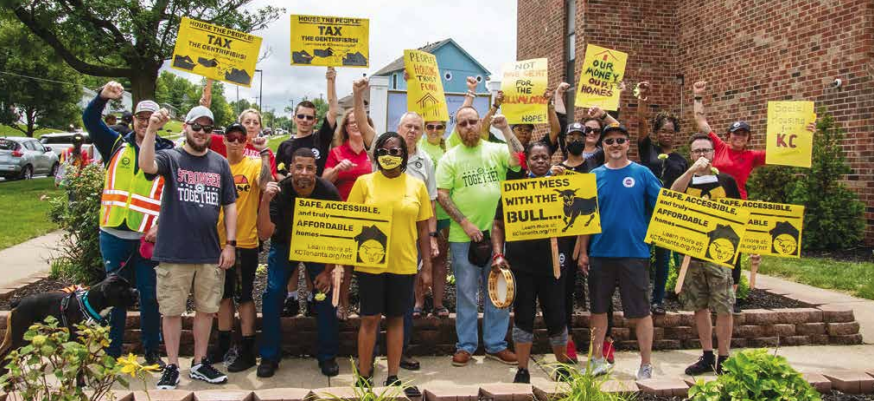Local 249: Putting the solid in solidarity

By Pat Hayes
Activists from UAW Local 249 and 710 joined tenants of Gabriel Towers in Kansas City June 26 to protest the slumlord Frank Sinito, the owner of Millenia Companies, which manages the property. The tenants, who are organizing with KC Tenants, complain about lack of air conditioning, black mold, insect infestation and unrepaired plumbing problems. They demand safe, accessible, and truly affordable homes.
In 2020 Millenia Companies was found in default of its contract at Gabriel Towers by Kansas City’s urban renewal agency following testimony by tenants and building inspectors. Millennia has an agreement with the city’s Land Clearance for Redevelopment Authority which allows it to avoid paying property taxes amounting to some $55,000 a year.
A subsequent inspection of the building by New Horizons, an environmental services company, found several kinds of mold, including black mold, in air samples.
The large and boisterous rally held in front of the housing project at Jackson and 16th Street on the East Side called for a People’s Housing Trust Fund to support the preservation and production of affordable housing that would increase opportunities for families and individuals to access decent affordable homes.
The trust envisioned by KC Tenants and their supporters would be overseen by people directly impacted by housing insecurity. Funding would come by divesting evictors, slumlords and gentrifiers.
“I believed I was poor because I did something wrong,” Jenay Manley, a leader of KC Tenants told the large enthusiastic crowd. “I was wrong. The problem is not us. It is the system. It is the profiteers who run this town.”
Many of the residents of Gabriel Towers, which describes itself as “an apartment community for those 62 and better, handicapped, or disabled,” have been organizing to demand that Millenia make needed repairs for several years.
“I joined the union and I changed my life,” says Sharice Crawford, a disabled tenant. “At Gabriel Towers, the power we have is the power of our union. We are like a family. Kansas City doesn’t want to love us like it should, so we’ve got to love each other.”
Like many renters across the country who have lost jobs and income due to the COVID-19 pandemic, residents of Gabriel Towers have faced eviction. Although the Centers for Disease Control (CDC) issued an eviction moratorium, Missouri failed to enact an eviction moratorium in 2020. St. Louis city and county, and Jackson County, which includes Kansas City, issued their own moratoriums, but leaders of KC Tenants report that some judges continue to issue eviction orders.
“I have to choose between food, medicine and rent,” says Sabrina Davis a KC Tenants leader who described an apartment infested with millepedes. “When I complained to management,” says Davis, “the treated me like a pest.”
The “State of the Nation’s Housing 2021,” published by Harvard University’s Joint Center for Housing Studies reports that “millions [are] struggling to cover the rent or mortgage, their housing situations have become increasingly insecure, and these disparities are likely to persist even as the economy recovers, with many lower-income households slow to regain their financial footing.”
It is a mistake to see slums as a byproduct of the modern city, rundown areas that occur by accident, according to a study in the American Journal of Sociology by Princeton’s Matthew Desmond and MIT’s Nathan Wilmers. They write that the slum has long been a “prime moneymaker” for those who profit from land scarcity, racial segregation, and deferred maintenance.
If labor exploitation is understood as getting paid less than the market value for what one produces, then we can extend this definition to the housing market where the poor are exploited by being forced to pay more for less,” write Desmond and Wilmers.
“Slumlords have us living like animals while inspectors look away and the city gives tax incentives to property owners,” says Ruby Watson, a resident of Garbriel Towers and leader of KC Tenants.
“I’m proud of UAW members for standing up for the exploited tenants of Gabriel Towers,” says Local 249 Eduction Chair Gary Thomas. This is what the labor movement is all about. Fighting to transform misery and despair into hope and progress.
Local 249 members Austin McFarland, Robin Taylor, Lynn Brown, Sydne Danaldson, Lukas Taylor, Kelsey Pinzino, Sam Wilson, Dolandra Leak, Gary Thomas, David Winkler, Nicholas Dibben, Chris Allindor, Travis Adams, Amy Minich, Stephanie Simpson, Shirley Mata, Jessica Bertocci and Arnetha Omeka helped with security and other tasks at the protest.
